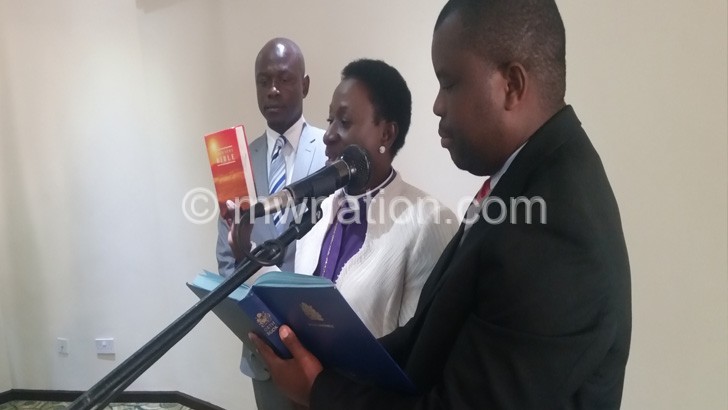Opposition admits failure over MEC
Major opposition parties in the country have admitted failure in pushing for a balanced composition of the country’s electoral body, the Malawi Electoral Commission (MEC).
President Peter Mutharika in June appointed eight new commissioners of the electoral body.
The appointment left the opposition only with three slots while the ruling Democratic Progressive Party (DPP) and its political bedfellow, the United Democratic Front, shared the remaining slots.
DPP has Jean Mathanga, Reverend Clifford Baloyi, Moffat Banda and Reverend Killion Mgawi while UDF, which is in a loose alliance with DPP is represented by Yahaya Mmadi and Elvey Mtafu. Opposition Malawi Congress Party (MCP) is represented by Mary Nkosi while the People’s Party (PP) has Linda Kunje.

PP spokesperson Noah Chimpeni on Tuesday admitted that the opposition had failed to ensure fairness in the appointment of MEC commissioners.
Chimpeni said the opposition should have been more vigilant on the issue, instead of accepting a status quo which democratic governance experts say defeats the likelihood of holding free and fair elections.
Said Chimpeni: “It is indeed unfortunate that we let things to go wrong at the very beginning, hoping that the elections will go our way. But when things do not work to our advantage we [parties] cry foul at the very end. Surely, we are giving Malawians a raw deal. Balance in the representation of commissioners is a prerequisite to holding of free and fair polls.”
Chimpeni added that PP is planning to court the main opposition MCP to map the way forward on the matter.
MCP director of elections Maxwell Thyolera on Wednesday in an e-mail response said the party is still not pleased with DPP’s dominance in MEC.
Said Thyolera: “When the President wrote the political parties represented in Parliament, asking for submission of four names, our understanding was that the four major parties [DPP, MCP, PP and UDF] would have two names each picked from the submitted names [which has been the tradition].
“That did not happen as such we voiced out our concerns and nothing changed. We did not pursue the matter knowing fully what happened prior to the 2009 elections when a similar scenario occurred. Former president, the late Bingu wa Mutharika, appointed MEC commissioners on his own and just notified the opposition parties. The courts upheld a decision to pursue the case but before the matter was pursued it was withdrawn from the Supreme Court because elections were approaching.”
He said opposition parties in the country were now banking their hopes on the electoral reforms expected to start soon.
Chairperson for the Malawi Electoral Support Network (Mesn), Steve Duwa, blamed the opposition for not doing enough to demand equal representation of commissioners at MEC.
He said: “Elections being a process are supposed to be handled well such that there is trust into the system by all stakeholders. The problem is that political parties that are key stakeholders in the electoral process are passive and they do not protest whenever the development arises. It is quite tricky even in how the laws were framed, stating that the President has to appoint commissioners in consultation with parties.”
The development also comes in the wake of a ruling in a high-profile case where the African Union (AU) African Court for Human and Peoples Rights (AfCHPR) in November faulted the Cote d’Ivoire government for failure to form a balanced electoral body in that country.
The court said the government in Ivory Coast violated its commitment to establish an independent and impartial electoral body as provided under Article 17 of the African Charter on Democracy.
Malawi is also party to the protocol that established the AfCHPR, which has its seat in Arusha, Tanzania.
On his part, Malawi Law Society secretary Khumbo Soko said interested parties would still take up the matter to appropriate authorities elsewhere although the country’s Constitution reigned supreme over any other law in this matter.
Said Soko: “Malawi is a party to the Protocol of the African Charter on Human and Peoples Rights which established the African court. It has further accepted the competence of the court to hear applications from individuals and NGOs from Malawi who could seek redress on whatever issue that is within the competence of the court. However, the jurisdiction of the African Court should only be engaged after exhausting local remedies.”
According to Soko, MEC independence is guaranteed under the country’s laws since the abiding fidelity for MEC commissioners is supposed to be the Constitution, electoral laws and the people of Malawi.
But Soko added: “We must be honest and admit that this is an ideal which may not be lived out in practice.”
Elections in Malawi have always been a contentious issue since the dawn of multipartyism with losers contesting results in the courts of law. n





